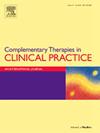音乐对老年痴呆患者焦虑和抑郁的干预:随机对照试验的系统回顾。
IF 2.2
3区 医学
Q2 INTEGRATIVE & COMPLEMENTARY MEDICINE
引用次数: 0
摘要
目的:本系统综述的目的是综合随机对照试验(RCTs)中关于音乐干预(MBIs)改善老年痴呆患者焦虑和抑郁的有效性的证据。方法:通过PubMed、Embase、EBSCOhost、Scopus、Web of Science、APA PsycINFO、谷歌等电子数据库检索相关rct。采用修订后的Cochrane随机试验风险偏倚工具(RoB 2)评估纳入试验的偏倚风险。对纳入的试验进行叙述综合。结果:9项rct共纳入496例患者,符合纳入标准;5项试验评估了mbi治疗焦虑的疗效,6项试验评估了mbi治疗老年痴呆患者抑郁症的疗效。在这九项试验中,有两项试验报告了MBIs后老年痴呆患者的焦虑有显著改善(Cohen’s d = -1.71至-2.48),而一项试验报告了抑郁有显著改善(Cohen’s d = -0.66)。结论:只有少数试验支持mbi在减轻老年痴呆患者负面情绪方面的功效,9项试验中有3项证明了这一点。然而,由于样本量小,痴呆类型、分期和干预措施的异质性,定量结果没有汇总,因此很难得出可靠的结论。进一步验证和检查本研究的发现是有必要的,以加强将mbi纳入痴呆护理和治疗方案的证据基础。本文章由计算机程序翻译,如有差异,请以英文原文为准。
Music-based interventions for anxiety and depression in older adults with dementia: A systematic review of randomized controlled trials
Objective
The objective of this systematic review was to synthesize evidence from randomized controlled trials (RCTs) regarding the efficacy of music-based interventions (MBIs) in improving anxiety and depression in older adults with dementia.
Methods
Relevant RCTs were identified through searches in electronic databases, including PubMed, Embase, EBSCOhost, Scopus, Web of Science, APA PsycINFO, and Google. The Revised Cochrane risk-of-bias tool for randomized trials (RoB 2) was used to evaluate the risk of bias in the included trials. A narrative synthesis of the included trials was conducted.
Results
Nine RCTs involving 496 patients met the inclusion criteria; five trials evaluated the efficacy of MBIs for anxiety, and six trials evaluated their efficacy for depression in older adults with dementia. Of the nine trials, two reported significant improvements in anxiety in older adults with dementia following MBIs (Cohen's d = −1.71 to −2.48), while one trial reported significant improvements in depression (Cohen's d = −0.66).
Conclusions
Only a few trials support the efficacy of MBIs in alleviating negative emotions in older adults with dementia, as evidenced by three out of the nine trials. However, due to the small sample sizes and heterogeneity in dementia types, stages, and interventions, quantitative results were not pooled, making it challenging to draw reliable conclusions. Further validation and examination of the findings presented in this study are warranted to strengthen the evidence base for integrating MBIs into dementia care and treatment protocols.
求助全文
通过发布文献求助,成功后即可免费获取论文全文。
去求助
来源期刊

Complementary Therapies in Clinical Practice
INTEGRATIVE & COMPLEMENTARY MEDICINE-
CiteScore
6.30
自引率
6.70%
发文量
157
审稿时长
40 days
期刊介绍:
Complementary Therapies in Clinical Practice is an internationally refereed journal published to meet the broad ranging needs of the healthcare profession in the effective and professional integration of complementary therapies within clinical practice.
Complementary Therapies in Clinical Practice aims to provide rigorous peer reviewed papers addressing research, implementation of complementary therapies (CTs) in the clinical setting, legal and ethical concerns, evaluative accounts of therapy in practice, philosophical analysis of emergent social trends in CTs, excellence in clinical judgement, best practice, problem management, therapy information, policy development and management of change in order to promote safe and efficacious clinical practice.
Complementary Therapies in Clinical Practice welcomes and considers accounts of reflective practice.
 求助内容:
求助内容: 应助结果提醒方式:
应助结果提醒方式:


